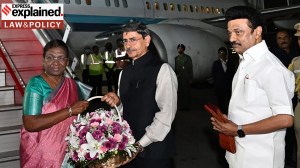Rubber exports from Tripura
TRIPURA is slowly but steadily coming out of the grip of insurgency and making small yet significant strides towards economic development. L...

TRIPURA is slowly but steadily coming out of the grip of insurgency and making small yet significant strides towards economic development. Last week, the state exported 31 tons of rubber to Bangladesh through the land route. Each ton fetched the state $600. Tripura has also emerged as the largest grower of rubber, a result of the government’s efforts to wean away farmers from the jhum (slash-and-burn) method of cultivation. Rubber, along with horticulture, provides an alternative to traditional means of agriculture and also protects the environment. With the land routes between India and Bangladesh through Tripura gradually reopening, the land-locked state is now also looking for a direct transit to Kolkata through Dhaka, a journey that would cut down the 56-hour-long from Agartala-Guwahati-Kolkata to six hours.
Needed: A human face for police
MOST police officers at the thana level were hardly aware of the term ‘‘human rights’’. This is what former Assam Human Rights Commission chairperson Justice R K Manisena Singh said here last week. Addressing a daylong workshop on human rights organised by the Assam Police in Guwahati, Justice Singh said the police force needed to be immediately trained on the basics of human rights, so that it could turn into a friend of the people instead of being dreaded as a law-breaking force.
Mizoram: Former rebels unhappy
A SECTION of the militants of the erstwhile underground Mizo National Front are unhappy after 16 years of signing of the Mizo Accord and end of insurgency in Mizoram. Their complaint is that funds meant for resettlement of the former rebels had been misappropriated and that the government had failed to institute an enquiry into the matter despite repeated reminders. The rebels, under the banner of Peace Accord Mizo National Front Returnees Association (PAMRA), who submitted a memorandum to Chief Minister Zoramthanga last Tuesday even threatened to launch a peaceful agitation if their demand was not conceded by August 14.
Bridging hearts in Arunachal
INAUGURATION of a bridge may not be news in mainland India. But when it is in Arunachal Pradesh, it is definitely worth a mention. The recent bridge completed by the Border Roads Organisation on the Noa-dehing, a major tributary of the Brahmaputra, was an occasion for celebration. The 637-metre long bridge, completed at a cost of Rs 26.23 crore, has reduced travelling distance between residents of the Lohit and Lower Dibang districts not just by 70 kms, but also by several hours of uncertain travel on fair-weather roads that disappear when the snow melts and rivers forget they have got definite courses.
Photos




- 01
- 02
- 03
- 04
- 05



























